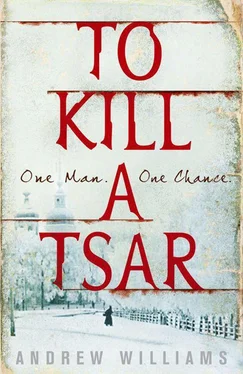Little Freddie Blackwood was suffering from nothing more than a head cold and a severe attack of boredom. A precocious four year old, he was bubbling over with curiosity to see the tsar and his Cossack guards and ride in a troika, but his anxious mother was refusing to release him from the embassy. Hadfield had taken his part: ‘Perhaps a little air and a little excitement would do him no harm.’ Since his visit to her bedside six months before — a journey Her Ladyship now recalled as an heroic life-saving dash across the city — his word as a physician went unquestioned at the embassy. The same could not be said for his judgement of pictures.
‘Do you like this one?’ she asked, as they were taking tea in the small drawing room. Two of the servants — one rather short, the other a little too doddery for the task — were holding a large landscape to the wall.
‘French?’ he asked uncertainly.
‘After Poussin,’ she replied, waving her hand at the servants. ‘A little to the right please. Yes, that’s perfect there.’
The picture hangers looked unsure what was expected of them.
‘Oh, would you, Doctor?’ said Lady Dufferin, exasperated.
Hadfield explained in Russian that Her Ladyship would like them to hang the picture precisely where they were holding it now.
‘The Countess von Plehve and Madame von Pahlen were very taken with the painting. Quite as good as some of the pictures in the Hermitage, they said. And I showed them the French furniture we have brought here for the dining room,’ she continued. ‘Madame Pahlen says it is finer than the furniture at the French embassy and that the Grand Duke Vladimir has just purchased something very like it.’
Hadfield smiled and nodded politely. He had no particular views on Louis Quinze cabinets and chairs or on the French Rococo style in general. But to an accompaniment of banging step ladders and hammering, Lady Dufferin slipped seamlessly from furniture to politics. Hadfield wondered if that was why conversation was commonly described as a drawing-room art rather than a science.
‘…and the Countess von Plehve said the imperial family was still shaken by the attack on the train. The police have been ordered to round up anyone suspected of sheltering or supporting these nihilists.’
‘I thought they had already done that, Your Ladyship,’ Hadfield replied.
‘No, not there, to the right!’ she shouted, rising from the sofa. ‘Oh, will you tell them, Doctor?’
The picture hangers climbed down their ladders and reassembled them closer to the mantelpiece.
‘…yes, well, it appears not,’ Lady Dufferin said, picking up the thread of their conversation. ‘But the ladies say one of the plotters is in custody, a Jew from Kiev called Silver. The most extraordinary thing: he was dragging a bag of dynamite along a station platform. Anyway, the police hope he will give them the names of the other conspirators.’
She paused again. ‘That’s it, that’s it. There.’ Then, settling her dress around her on to the sofa, the conversation moved just as seamlessly from politics to the sledging hills at the yacht club and the evening’s expedition to the Yusupov.
But Hadfield’s thoughts were with the little Jew called Silver and his dynamite. Silver or Gold? How many Jews from Kiev were there in the revolutionary movement? Poor Anna. He could remember the warmth as well as the exasperation in her voice when she spoke of him. Would she be safe? Perhaps she was in custody too? And would Goldenberg mention to his captors the English doctor who had once had the temerity to question the wisdom of killing a tsar?
‘…Doctor?’
‘I’m sorry, your Ladyship.’
‘Please explain to them I want the McCulloch of the Highlands in the dining room…’
To Major Vladimir Barclay’s mind the Jew looked anything but a desperate terrorist in his torn and dirty great coat. They had spoken only briefly; Goldenberg to spout a well rehearsed justification of the attack on ‘the tyrant’. Barclay had ordered him to hold his tongue or he would teach him some manners.
Rising from his seat, he stepped over to the window — the station concourse was crowded with people — then back to the stove. The train was late, there was a gale blowing through the detention room, and Barclay’s patience was wearing very thin.
‘Fetch me some tea,’ he barked at the corporal standing at the door.
He had been waiting at the Nikolayevsky for nearly three hours. Goldenberg was wedged between gendarmes on the seats opposite, and there were a dozen more outside. They were going to take no chances. Not only had he fought like a tiger at Elizavetgrad — it had taken six of the local gendarmes to subdue him — but he was the only one of the conspirators they were holding in custody.
Barclay had arrived in Moscow two days after the explosion and had seen the cottage and the remains of the tunnel the terrorists had dug to the railway embankment for himself. On his third day in the city, he had helped the local gendarmes arrest a well known radical at the university. After a little direct pressure, the student had admitted sheltering a revolutionary called Hartmann and his female companions in the hours after the explosion. One of the women was certainly Sophia Perovskaya. His description of the other — small, silent, a little sullen with strikingly blue eyes — had brought to Barclay’s mind a mental picture of Anna Romanko. The student had accompanied the three of them to the Belorussky Station where Hartmann had purchased a ticket for Berlin. He was not certain, but he thought the women had taken a train to St Petersburg.
The corporal returned with some tea and the news that word was spreading through the station that one of the terrorists who had tried to kill the tsar was being held in the detention room. A hostile crowd was gathering at the foot of the stairs.
‘Can I have some tea too?’ It was Goldenberg.
Barclay glanced over the top of his glass at him contemptuously.
‘Well?’
‘If you don’t shut up, you’ll get more than tea. I’ll hand you over to the mob.’
Goldenberg wrinkled his face disdainfully. ‘You’re not going to do that, Major. Not yet. I’m far too valuable.’
Damn the fellow, Barclay thought, he was right.
23 NOVEMBER 1879
124/5 NEVSKY PROSPEKT
They spoke of it often, and always with deep sadness and a sense of injustice. To have prepared so thoroughly and to have come so close — it was a blow to the morale of all. One evening after their return to St Petersburg, Anna was preparing supper in a safe house on Nevsky. Conscious of a particularly long silence, she looked up to find Sophia Perovskaya standing at the sink, her hands in icy water, eyes fixed blankly on the wall.
‘Sonechka,’ Anna said, rising from the table, a knife still in her hand.
‘It wasn’t my fault, was it?’
‘How could it be your fault?’ Anna stepped over to the sink and put her arms about Sophia’s waist, pressing herself against her small body. ‘We only managed to get as far as we did because of you.’
‘I’m sorry,’ she said, turning in Anna’s arms to face her. ‘I’m fine, really. I know I must be strong.’
Anna reached for her hands, still rough and chapped from the work at the cottage, and very cold. ‘You are the strongest among us.’
It was a little shocking. No one had seen Sophia falter. But weeks of nervous exhaustion, hard labour, the scheming, the lying and the fear of the gendarmes at the door had taken their toll on all of them. They sat side by side at the table and finished preparing supper — for the most part in silence — until they were joined by other comrades, Kviatokovsky, Morozov and Olga Liubatovich. No one spoke again of past failure that evening or of the plans for the future, but when they had eaten they laughed and joked and drank and sang together until late in the evening. Sophia Perovskaya’s apartment was a cab journey away and she left at ten o’clock with Kviatkovsky, who lived close by. Anna was to spend the night in the little flat on Nevsky with the other two and return to her schoolhouse at Alexandrovskaya in the morning. She was anxious about her safety and would have preferred the life of an ‘illegal’ with her comrades in the city, but the executive committee had decided she should resume her teaching post in the village. ‘The party needs people who can move freely, without fear of arrest,’ Alexander Mikhailov had told her. The Director had assured him the Third Section was a long way from identifying her and she was ‘clean’. Of course, there would be questions after so many months away, but Mikhailov had made her write regular bulletins on her mother’s health to the local priest and had arranged for them to be sent from Kharkov.
Читать дальше












